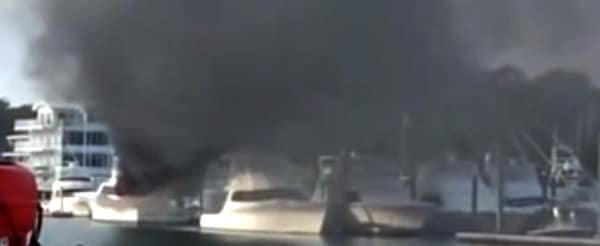Checking it Thrice
Mruphy’s Law states anything that can go wrong, will go wrong, and most of us would probably agree that the probability seems to quadruple when you own a boat. If anyone has seen it all, it’s insurance experts like Christi Insurance Executive Vice President Eric McDowell, “Of all the things that can go wrong at sea, an onboard fire is arguably one of the most frightening scenarios.” Indeed, with nowhere to run and first responders possibly hours away, an out of control fire can quickly doom a vessel and claim lives. Once fiberglass starts to combust, it reaches incredibly high temperatures, emotes a thick, toxic black smoke and burns at an alarmingly fast rate. Consequently, fires within a marina or boatyard are of an especially devious nature, as they can rapidly hop from one boat to the next in adjacent slips or crowded haul-out lots.
Whether or not you have witnessed a boat fire first-hand, it shouldn’t take much to motivate you to take some simple preventative steps. In fact, one of the only common causes of a vessel fire that can’t be prepared for, or possibly prevented by more care, is that of a lightning strike. The following are the three main issues to look out for.
Electrical Fires
According to data from Boat U.S., electrical faults originating from either the DC or AC wiring systems are the leading cause of fires started aboard, at 55% of claims. On the DC side, compromised wire insulation can be quite common as battery, alternator, bilge pump, and instrument wires chafe on sharp objects as an engine throbs and vibrates. Poorly secured or even non-existent wiring harnesses may result in wires falling or resting on hot mechanical parts such as manifolds and exhaust systems. Once the insulation melts or chafes away, an electrical short of some kind is nearly inevitable; compromised wires should be replaced immediately. McDowell adds, “Persistent vigilance while owning your boat is key, and poor electrical installations remain a top reason to have a professional survey performed when buying any used vessel. Sometimes you never know what you’re going to find.” On any boat, corrosion is always a concern and can affect the safety of both DC and AC wiring. A common cause of fires started on the AC side are corroded, or otherwise faulty, shore power cords. Over years of outdoor use or perhaps due to poor construction quality, plug prongs deteriorate, bend or even melt. Plugs with visible defects or that feel overly loose after working them into a receptacle, should be considered highly suspect and repaired or replaced.

Overheating
The overheating of propulsion systems including engines, transmissions and turbo chargers account for nearly a quarter of reported boat fires. Blocked coolant systems can quickly escalate an engine to excessive temperatures that start to melt hoses and impellers. While McDowell admits these fires are often of the “slow and smoldering” variety, dark smoke from the engine room typically gets the Captain and crew’s attention very quickly, “and then someone makes the mistake of opening the engine room and introducing a bunch of fresh air into the equation,” he adds. Experts agree the best way to handle an engine room fire is to let an automatic suppression system do it for you. Short of that, you should shut down the engine(s) and discharge a fire extinguisher through a fire port. If none exists, crack open the hatch or engine room door as litt le as possible while allowing you to discharge the extinguisher. Again, the wisest approach is prevention in the form of routine maintenance in order to avoid overheating problems in the first place.
Fuel Leak
Approximately eight percent of vessel fires are reportedly caused by fuel issues, with gasoline systems accounting for 95% of those cases. Certainly the most explosive and devastating type of fire on our list, gasoline leaks most typically occur around fuel lines, at connections to the engine itself or from the fuel tank. “Fortunately, routine visual inspections and an aware nose are usually all that is needed to sniff out gasoline leaks.” McDowell says. With these simple tips, anyone should be able to effectively prevent – or worst case, react capably to vessel fires. It’s important to review these scenarios with your crew and make sure everyone aboard knows the location and operating procedures of your extinguishers. Annual equipment inspections by a certified professional is also highly recommended. Ultimately, arming yourself and your crew with as much knowledge as possible and taking the time to routinely go over all the systems in your boat will make your boating experiences safer and more enjoyable, as well as reduce your operating costs in the way of repairs and insurance premiums. Now that’s something that should effectively motivate all of us.
Modern Fire Prevention
There are a wealth of products and services available today to make your boat safer and smarter. Consider these points when updating or buying your next boat:
 Using ABYC Certified products, manufacturers, surveyors and electrical contractors are a relatively simple way to help ensure your boat’s wiring and appliances meet or exceed marine safety and functionality standards.
Using ABYC Certified products, manufacturers, surveyors and electrical contractors are a relatively simple way to help ensure your boat’s wiring and appliances meet or exceed marine safety and functionality standards.
 Fuel Tanks are commonly manufactured out of aluminum, high-carbon steel, black iron, fiberglass, polyethylene, or stainless steel. Metal fuel tanks are susceptible to corrosion, but are considered stronger in most cases. If a tank fails, you might consider replacing it with a unit made from a different material, as it may have a greater potential to withstand the specific conditions on your boat. Remember that in gasoline configurations, a blower fan should be installed for each engine or generator.
Fuel Tanks are commonly manufactured out of aluminum, high-carbon steel, black iron, fiberglass, polyethylene, or stainless steel. Metal fuel tanks are susceptible to corrosion, but are considered stronger in most cases. If a tank fails, you might consider replacing it with a unit made from a different material, as it may have a greater potential to withstand the specific conditions on your boat. Remember that in gasoline configurations, a blower fan should be installed for each engine or generator.
Automatic Fire Suppression systems are the fastest and safest way to combat an engine room fire. Solutions vary based on the size and volume of your engine compartment, but when in doubt, select the largest size available to ensure adequate protection.
 Fire Extinguisher Classes are categorized by the types of fires they are capable of putting out. A simple rule of thumb is that class A fires are solids, class B fires are liquids, and class C fires are energized electrical fires. The U.S. Coast Guard regulations vary based on the size and fuel type of your vessel, but if you want to be prepared for just about anything, make sure all your extinguishers are ABC-rated.
Fire Extinguisher Classes are categorized by the types of fires they are capable of putting out. A simple rule of thumb is that class A fires are solids, class B fires are liquids, and class C fires are energized electrical fires. The U.S. Coast Guard regulations vary based on the size and fuel type of your vessel, but if you want to be prepared for just about anything, make sure all your extinguishers are ABC-rated.
 Fire Ports are small fixtures that can be installed in hatches or bulkheads to permit a fire extinguisher to be discharged into an engine space or other enclosed area. The extinguisher nozzle is inserted through the port to avoid opening the compartment and fueling the fire, while also reducing risk to the crew. One caveat is that you can’t effectively manage a small fire if you’re spraying blindly, so look for a fire port that is clear in color or is otherwise
designed to allow good visibility into the space.
Fire Ports are small fixtures that can be installed in hatches or bulkheads to permit a fire extinguisher to be discharged into an engine space or other enclosed area. The extinguisher nozzle is inserted through the port to avoid opening the compartment and fueling the fire, while also reducing risk to the crew. One caveat is that you can’t effectively manage a small fire if you’re spraying blindly, so look for a fire port that is clear in color or is otherwise
designed to allow good visibility into the space.
